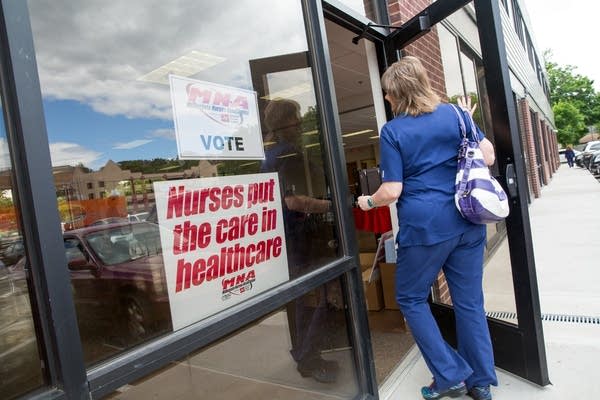Strike fears loom as 5,000 Twin Cities nurses weigh contract

Like this?
Log in to share your opinion with MPR News and add it to your profile.
Like this?
Thanks for liking this story! We have added it to a list of your favorite stories.
Nearly 5,000 union nurses vote Monday on a contract offer from Allina Health. Union leaders predict it will be rejected and both sides are preparing for the possibility of strikes at four major Twin Cities hospitals.
The contract vote involves nurses at Abbott Northwestern, Mercy, Unity and United hospitals. The key issue: the nurses' health coverage.
The Minnesota Nurses Association has rejected Allina Health's demand that the nurses abandon their high-value health coverage set out in past contracts. Allina wants the nurses in the plans offered to other employees. That insurance comes with lower monthly premiums but much greater potential out-of-pocket costs.
The nurses consider their union health plan an important part of their compensation, and Allina is trying to shift health care costs onto them with nothing in return, said critical care nurse Angela Becchetti, an Allina nurse for 10 years.
Support the News you Need
Gifts from individuals keep MPR News accessible to all - free of paywalls and barriers.
"What Allina is offering to the nurses is high-deductible plans and higher out-of-pocket maximums," she said.
Allina says moving the nurses to its corporate core plan would reduce overall health costs by $10 million a year. Much of the savings, it says, would result from the higher cost-sharing the union opposes. The company argues cost-sharing encourages thriftier choices, such as going to an urgent care when a much more expensive emergency room visit would be overkill.
The change is must-have, said Allina spokesperson David Kanihan. "We are committed to transitioning them to our corporate health plan."
Allina's corporate plans could cost nurses thousands of dollars a year more, counters Becchetti, one of the union negotiators.
"When I had my kid, I paid a co-pay. Now if I were to go on the Allina core plan I would pay $12,000 just to have a child," she said.
Allina calls that an example of misinformation it says the union is putting out to scare nurses about the corporate health plans.
The company concedes it's technically possible to reach that $12,000 out-of-pocket maximum, but only for the 1 percent of current employees who choose their highest deductible option. Even then, the company says, a pregnancy scenario that could lead to such charges is extremely unlikely.
The average cost to have a baby on its most popular plan is about $1,000, said Kanihan, who insisted there's nothing substandard about Allina's corporate insurance.
"It's a good solid health plan," he said. "It covers over 30,000 other employees and their dependents."
The Minnesota Nurses Association and most major Twin Cities hospital systems historically negotiated their contracts at the same time. In 2010, more than 12,000 nurses from 14 metro-area hospitals walked out on a one-day strike.
This time around Allina's nurses are on their own. Nurses at the other hospital systems settled months ago.
Allina's nurses may be in a stronger position than six years ago, said John Budd, an industrial relations professor at the University of Minnesota.
If they do walk out, union nurses at other hospital systems will still be collecting paychecks and can help them pressure Allina, he said.
"If a strike would drag on for a while, and you get to a situation of members needing financial support and other types of support in this way, the other nurses who are working can be supporting the nurses who are out on strike," Budd added.
Even if Allina's nurses authorize a strike today as expected, a walkout requires 10 days' notice.
Becchetti said she hopes a strike authorization will bring Allina back to the table so a strike can be averted. "We're hoping that we don't have to come to it, but the nurses are prepared."
Allina is also ready, Kanihan said. The system has already tapped nursing temp agencies comfortable in "these sorts of situations," he added.
That doesn't appear to be a bluff. The Minnesota Nursing Board says license applications from out-of-state nurses over the past two months are double the same period last year.


